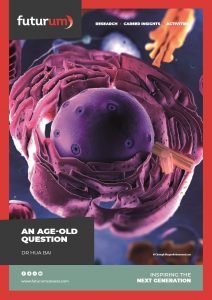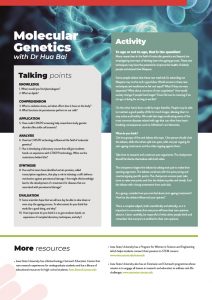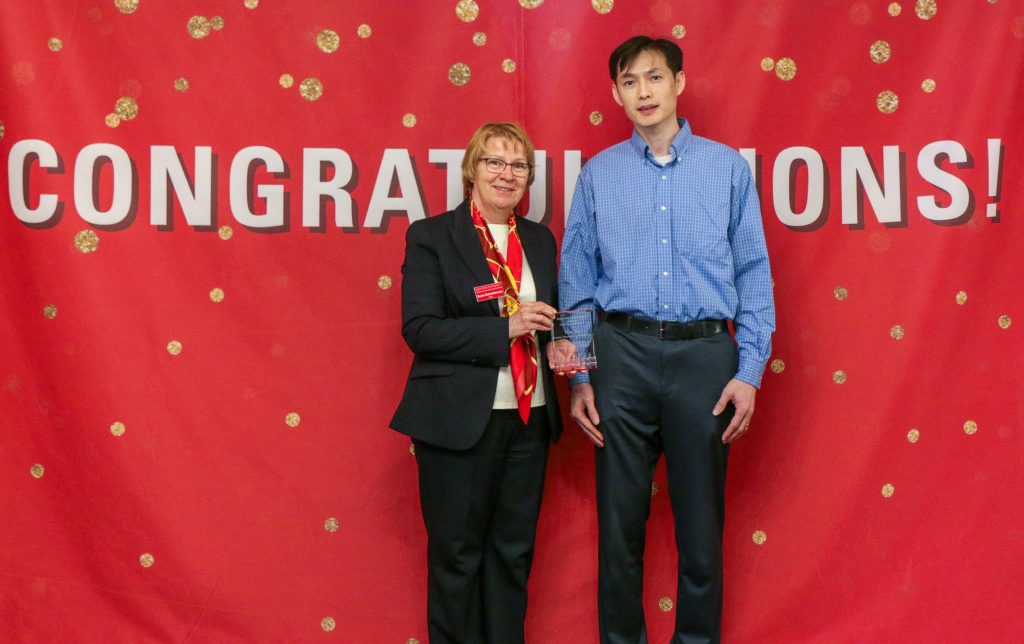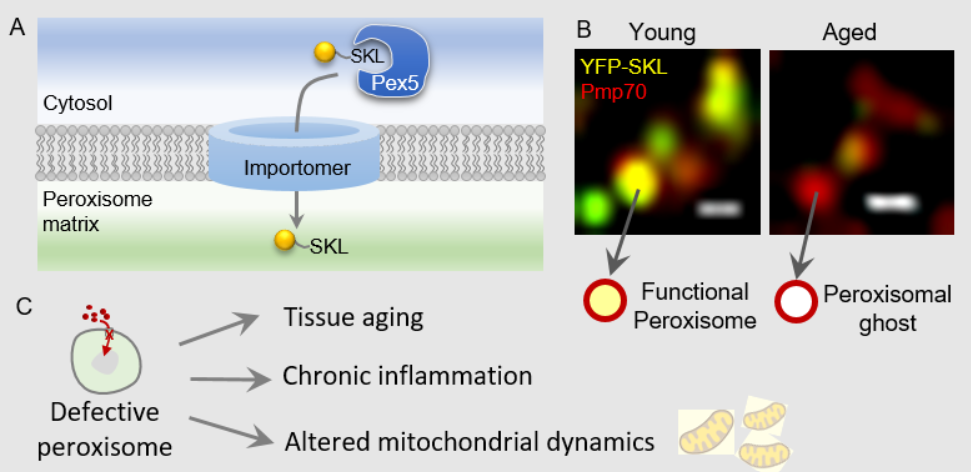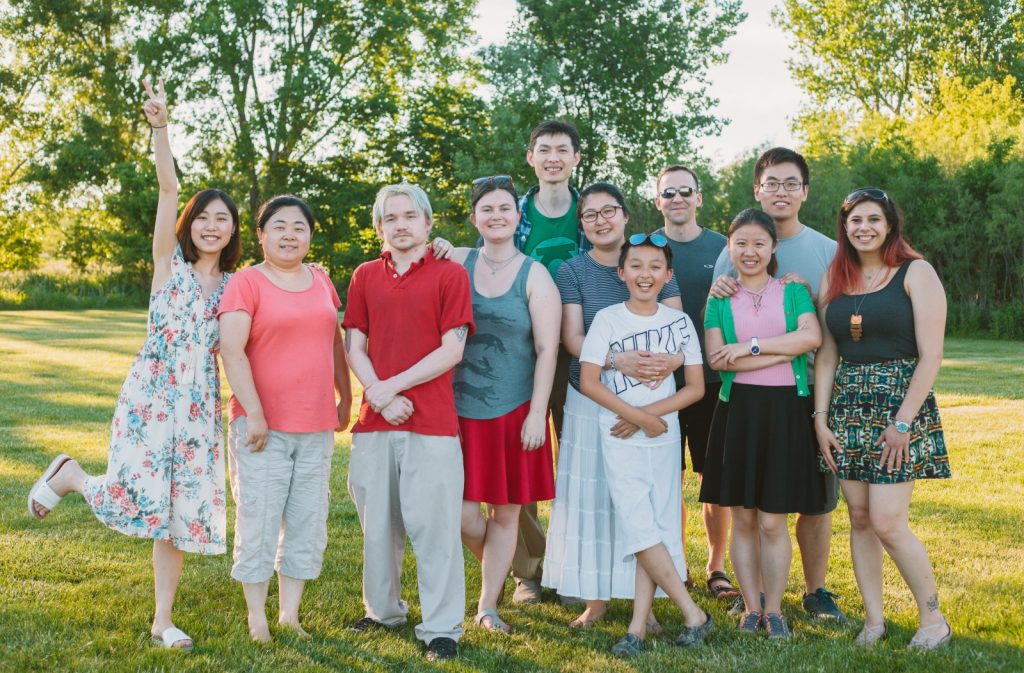An age-old question
As we reach the later years of our lives, our skin will wrinkle and our hair will turn grey. We may have mixed feelings about ageing, but it is a natural part of life. Although we may never be able to prevent ageing, some scientists think that we may be able to slow it down. Dr Hua Bai from Iowa State University in the US is studying a process in our cells that is thought to contribute to ageing. He hopes that this research may help us find new ways of slowing down the ageing process.
TALK LIKE A MOLECULAR GENETICIST
CRISPR screening — an experimental technique that can identify a small number of important genes within a much larger gene pool, such as an entire genome
Enzyme — a protein molecule that speeds up chemical reactions in cells
Metabolism — the set of chemical processes in the body that breaks food down into energy
Oxidative stress — an imbalance between the amount of reactive oxygen species and the body’s ability to detoxify them or repair the damage they cause
Peroxisome — organelles inside our cells that play an important role in metabolism and other cellular processes
Reactive oxygen species — an unstable molecule that contains oxygen and that easily reacts with other molecules, often damaging them
What is one thing that you have in common with every other person on Earth? Well, from the day we are born until the day we die, all of us are getting older. Although some of us might like to pretend otherwise, ageing is a part of life that we cannot ignore.
At some stages in our life, getting older can feel liberating. As a young adult, each new year that we age seems to bring new opportunities, as well as responsibilities. But, as we reach the later stages of life, ageing can become a source of aches, pains and anxieties.
For most of us, the thought of old age is not an appealing one. Hips start to ache, memories fade and hearing aids are turned up. We also become more prone to diseases such as cancer, Alzheimer’s and arthritis, which can greatly reduce a person’s quality of life. It is not uncommon for humans to spend the last few years of their life in discomfort or pain.
What if we could slow down the ageing process? What if we could make the last few years of our lives comfortable and pain-free? To slow down the process of ageing, we first need to understand how the process works by answering the question: Why do we age? Dr Hua Bai, from Iowa State University, is studying exactly this. His research focuses on peroxisomes and the role these small cell structures play in ageing.
What are peroxisomes?
Peroxisomes are organelles found in almost all of the cells in our bodies. They contain many enzymes and play an important role in our metabolism, which is how our bodies turn food into energy or the building blocks of cells (like DNAs, RNAs, proteins and lipids). For example, peroxisomes are particularly important for breaking down fatty acids, also known as lipids, which are an important source of energy.
Peroxisomes can also manufacture structural and functional lipids which can be used in other processes. For example, peroxisomes help to create plasmalogens, which are key components of the membranes surrounding heart and brain cells. Peroxisomes also contribute to important processes in the kidneys and liver.
Lastly, peroxisomes contain a large amount of detoxification enzymes, called catalase, that can convert the reactive oxygen species hydrogen peroxide to water and oxygen, and protect cells from oxidative damage.
What role do peroxisomes play in ageing?
Recent studies have shown that peroxisomes begin to deteriorate as organisms get older. “The loss of peroxisomal function during ageing can lead to metabolic disorders, elevated oxidative stress and inflammation,” says Hua.
Oxidative stress occurs when reactive oxygen species build up in the cells and tissues of an organism. Reactive oxygen species are unstable molecules that can damage other important molecules within a cell, such as DNA. Peroxisomes play an important role in balancing oxidative stress, so when they begin to deteriorate, the damage caused by reactive oxygen species increases.
The process of ageing in the human body is complex and is affected by many different factors. For example, our DNA molecules become damaged and fail to replicate properly. If the DNA in a cell becomes sufficiently damaged, the cell may destroy itself so that the damaged DNA is not replicated.
As we get older and our peroxisomes begin to function less effectively, the concentration of reactive oxygen species in our cells increases, leading to DNA damage and cell death. This excessive cell death can lead to a whole host of problems that further accelerate the deterioration of the body.
Is there any way to stop peroxisomes from failing?
Reference
https://doi.org/10.33424/FUTURUM397
“One important question in peroxisome research is whether our cells can activate a defence mechanism to protect themselves from cellular damage associated with peroxisomal dysfunction,” explains Hua. He is hoping to identify the ways in which cells can monitor the deterioration of their peroxisomes and whether they have any mechanisms to protect against peroxisomal damage.
By answering these questions, Hua hopes to gain a deeper understanding of the ageing process and how cells fight against it. He hopes that this may lead to the development of treatments and techniques that might be able to slow the ageing process.
How is Hua studying this?
Hua and his team are using advanced genetic and biochemical tools to study peroxisomes. For example, one genetic tool the team uses is CRISPR screening. This is a newly developed genetic screening method that allows researchers to examine the effects of specific mutations on human genes.
The advantage of CRISPR screening is that it can be used to study every human gene in a single experiment. Using this method, Hua can quickly identify which genes are responsible for protecting cells from peroxisomal dysfunction.
One of the biochemical techniques that Hua uses in his investigations is called TurboID proximity labelling. This allows him to identify which proteins interact with each other within a cell. TurboID is a powerful technique that can reveal interactions between proteins, even if they are weak and occur very quickly.
This technique may help Hua to uncover how cells monitor the deterioration of their peroxisomes. By testing proteins on the surface of a peroxisome, he can discover which other proteins they interact with. This will allow him to start building up a picture of the signalling pathways that allow the cell to monitor the condition of the peroxisome.
What has Hua discovered?
Hua and his team have already identified several proteins that play a part in activating protection mechanisms within a cell. Hua found that if these proteins were prevented from doing their job by genetic mutations, the cell’s protection mechanisms were less effective, and the cell was more likely to die as a result of peroxisomal damage.
Hua’s team has also conducted the first comprehensive analysis of how peroxisomes send signals to the cell’s nucleus. It is these signals, that the peroxisome sends when it is deteriorating, that activates the cell’s protection mechanisms.
What are the next steps?
Hua’s next step is to dig deeper and understand how peroxisomal damage activates these signalling pathways. Once he has a complete understanding of these pathways, Hua hopes that he will be able to help develop an effective treatment for diseases that are related to ageing and peroxisomal deterioration.
Hua is also developing an innovative laboratory course designed to give undergraduate students hands-on experience with CRISPR technology. “This is a very effective way to improve student learning of difficult subjects like genetics, and to make research opportunities accessible to a large and diverse student population,” explains Hua.
This course will help to give the next generation of molecular geneticists the skills that they need to conduct their own research projects. At the moment, much of the ageing process remains a mystery; there are many fascinating questions for researchers like Hua and his students to explore.
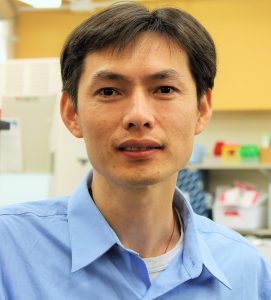 Dr Hua Bai
Dr Hua Bai
Department of Genetics, Development, and Cell Biology, Iowa State University, USA
Field of research : Molecular Genetics
Research project: Investigating why and how our bodies age as we grow older
Funder: US National Science Foundation (NSF)
About molecular genetics
Molecular genetics is the branch of genetics that investigates the structure and function of genes on a molecular level. Genes are made up of long strands of DNA molecules which contain the information needed for an organism to grow and survive. Our genes tell our cells which proteins to produce and determine how are bodies develop, grow and function.
Molecular geneticists track how changes in genes at a molecular level affect the organism as a whole. Despite occurring on such a small scale, some of these mutations can have serious consequences. For example, sickle cell anaemia, a genetic disorder that reduces the amount of oxygen in the bloodstream, is caused by a mutation that affects a tiny portion of DNA. Hua’s research focuses specifically on the genes that are related to peroxisome deterioration. He has identified proteins, known as transcription regulators, that help to protect cells from peroxisomal damage. Transcription regulators are molecules that can influence which RNAs and proteins are produced by genes.
Hua and his team use the CRISPR screening technique to conduct their research. He explains, “With advanced whole genome sequencing techniques and innovative CRISPR-mediated genome editing tools, molecular geneticists can now precisely manipulate animal and plant genomes to understand the molecular function of all genes coded by every genome. Eventually we will be able to decode the fundamental causes of human genetic diseases and ageing.”
Pathway from school to molecular genetics
• Studying science subjects at school, particularly biology and chemistry, is a good place to start. If you get the chance, focus on molecular biology, cell biology, biochemistry and genetics.
• Contact local universities to try and arrange some work experience in a research lab. Hands-on experience of this kind provides invaluable insights into research work.
• Many universities offer undergraduate degrees in molecular genetics. Do some research and see which course best fits your interests and ambitions.
Explore careers in molecular genetics
• Working as a molecular geneticist, you might spend your days conducting experiments in the lab, analysing and interpreting data, and writing findings into academic research papers.
• Molecular geneticists may work with scientists from different fields including medical science and biochemistry. It is important to work effectively as part of a team and to be able to communicate your research to others.
• Try to work in more than one genetics research lab early in your career. Genetics is a broad field, so learning which parts of it you are most interested in and most enjoy can be very useful.
• There are many societies you can explore to find out more about the fields of genetics and molecular biology. For example, the American Society for Biochemistry and Molecular Biology, The British Society for Genetic Medicine, and The Genetics Society.
• According to salary.com, the average salary for a molecular geneticist in the US is around $70,000.
Q&A
Meet Hua
What inspired you to become a scientist?
In my childhood, I always enjoyed being surrounded by nature: trees, flowers, ants and birds. I became interested in biology and medicine when I first subscribed to Scientific American during middle school. I was fascinated by the complex biological systems it described, and I am still amazed by how little we know about cells and the causes of human diseases. Through some advanced courses at college, I fell in love with animal physiology and molecular biology and decided to pursue a scientific career to devote my life to understanding how various tissues and organs in our body communicate to coordinate daily function.
What experiences have shaped you as a scientist?
Coming to the US for my PhD and postdoctoral training was a great experience that led me to decide that I wanted to be an animal physiologist and molecular geneticist. My PhD and postdoctoral mentors are my role models. They taught me how to conduct research projects, write scientific journal articles, and apply for funding to support future research. A great mentor is very important in shaping us as scientists.
The eureka moment in my career was when my students and I discovered the unexpected role of peroxisomes in ageing regulation and liver-heart communication. We then realised that peroxisome research is a hidden treasure that has great potential to contribute to many age-related diseases. This was the turning point of my lab research and, since then, we have been actively exploring the function of peroxisomes in cells and how its dysfunction relates to diseases.
What do you find rewarding about your work?
Firstly, I am very excited about the previously unknown function of peroxisomes that we have discovered through molecular genetics analysis. Secondly, it is gratifying to train the next generation of scientists and watch my students grow into great scientists, and potentially even future leaders in the field.
What are your ambitions for the future?
I hope our peroxisome research can contribute significantly to the development of pharmaceutical treatment of age-regulated diseases, like heart diseases, metabolic diseases, and neuronal disorders.
Hua’s top tips
1. Follow your heart and work on your dreams.
2. Be persistent. Scientific discoveries can be hard, and you may face many challenges, but keep going!
3. Always look for new ways to improve your logical thinking.
Do you have a question for Hua?
Write it in the comments box below and Hua will get back to you. (Remember, researchers are very busy people, so you may have to wait a few days.)

